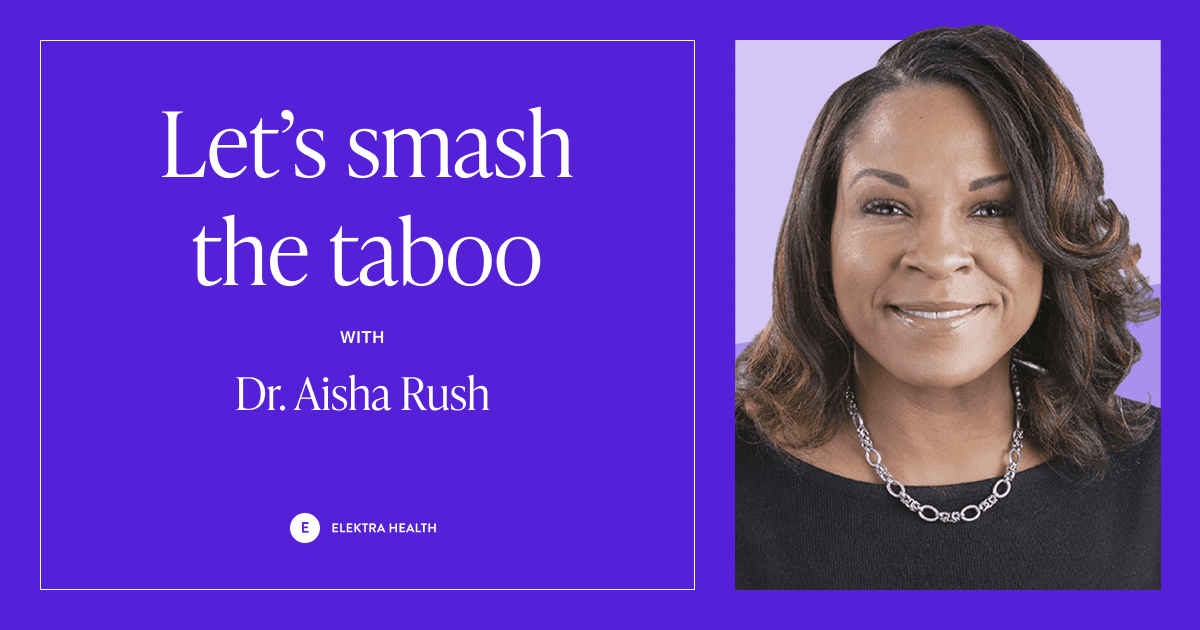
Published on Jan 26, 2022
Last modified on Jan 26, 2022
#TabooSmasher Spotlight: Dr. Aisha Rush
3 min read

Dr. Rush pays close attention to her patient’s needs. She focuses on each patient from a biopsychosocial model and is attentive to the intricate needs of each patient. She graduated from Michigan State University College of Human Medicine and completed her residency at Temple University Hospital. She has also obtained a Master’s Degree in Sociology and a Master’s in Business Administration. She is Board Certified and is a member of several professional organizations. She comprises a vast array of skills and knowledge when it comes to medicine and the needs of patients.
What are your thoughts on doing a sober month like Dry January, and do you have any tips for setting people up for success who want to try it?
Whatever your reason for exploring sobriety, I think it’s always an excellent idea to take a break from drinking. I often encourage my patients to take part in Dry January (or another sobriety challenge like Sober September), because it gives the body a reset. A month without alcohol can allow bodily functions that have been affected by alcohol use to return to normal, which leads to improvements in sleep quality, anxiety levels, hydration levels, and much more. Taking a break from alcohol can also be empowering on an emotional level. In that month sober, someone is not only taking control of what they’re putting into their body, but reenvisioning what their relationship with alcohol may look like in the future. Dry January is a physical, mental, and emotional reset for many, and can bring about important clarity.
We know that alcohol consumption can exacerbate certain menopause symptoms—do you have any advice specifically for women going through menopause who are interested in changing their relationship with alcohol?
For women experiencing menopause symptoms, I would recommend they work toward limiting the amount of alcohol they consume on a weekly basis. I know this can feel daunting at first. I often remind my patients that small changes can amount to great rewards. Remember that a curiosity in how drinking less can help you feel better is all you need to get started. I recommend listening to and trusting the signals your body is giving you. Speaking to a physician about your specific symptoms and goals for reducing your consumption can help you build a personalized plan that feels achievable and encouraging.
For women who are experiencing overwhelming symptoms that significantly disrupt their daily lives such as hot flashes, disrupted sleep, and mood swings, your healthcare provider may recommend that you pursue abstinence. Everyone’s needs are unique, which is why we advocate for personalized care at Monument. Regardless of your goal, finding a supportive community of others who share similar experiences can also provide encouragement, accountability, and relief. You are not alone in this.
How does Monument support its members, and what’s are the benefits to being an online the time commitment and the advantage of an online resource?
Monument is an evidence-based treatment platform for anyone looking to change their relationship with alcohol. Monument is completely confidential and entirely virtual. Anyone can use our platform from the safety and comfort of their own home, which reduces the barrier of entry for folks seeking support. Moreover, Monument is free of absolutes and labels – you don’t need to meet any criteria to join and start building healthier habits.
Our free resources include access to a 24/7 anonymous community forum, a collection of clinician-authored resources, and over 50 free therapist-moderated groups every week on a variety of topics – from managing drinking during the pandemic to navigating sobriety or moderation for women. Members seeking one-on-one treatment are introduced to a licensed physician, such as myself, who can prescribe FDA-approved medication to stop drinking or cut back, and/or a specialized therapist who can help them better understand their habits and develop healthier coping mechanisms. Our resources and treatment plans are built so that you can choose whatever level of commitment fits your own needs, schedule, and preferences. Members can schedule appointments whenever it works for them, and check in in the community at any time.
Is Monument for the sober curious or only for those who’ve committed to removing alcohol from their lives entirely?
Everyone is welcome at Monument. Whether you’re exploring how drinking less can give you more, or have already decided that abstinence best serves your needs, you have a supportive community here to cheer you on. It’s never too early or too late to change your drinking habits. Additionally, there isn’t a single portrait of what unhealthy drinking looks like, and there isn’t a one-size-fits-all solution for changing your relationship with alcohol. Our virtual door is open to all, whether your goal is to moderate your drinking or quit altogether.
Why are you personally passionate about working in the alcohol recovery space?
Several of my family members have suffered and continue to struggle with alcohol use disorder. I know the toll it can take on not only the individual, but also family and friends. It’s always my hope that I am able to help others find a way to either have a better relationship with alcohol or completely abstain if that’s their choice. It’s an incredibly rewarding and inspiring experience to witness how this change improves their overall health and happiness.


